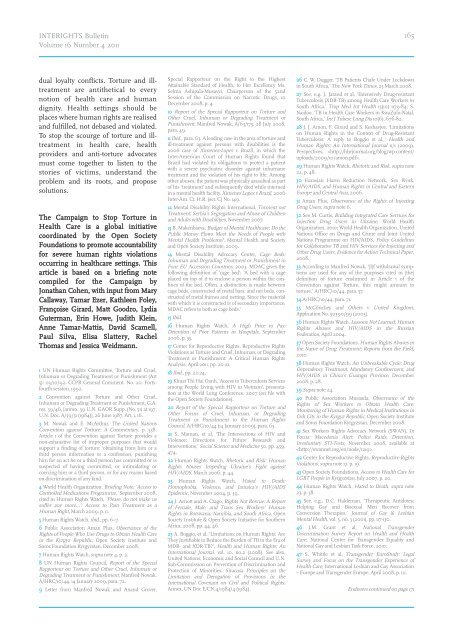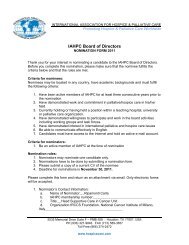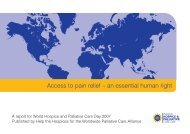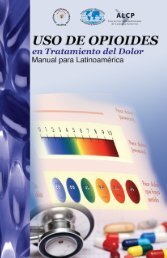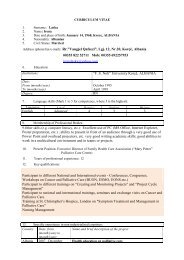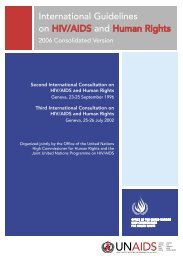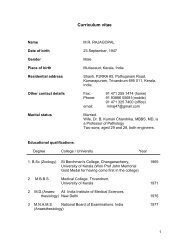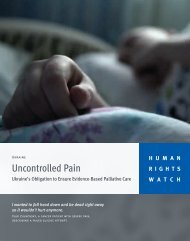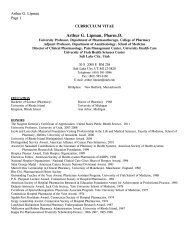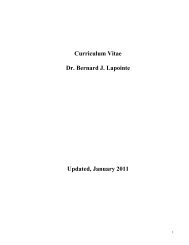INTERIGHTS Bulletin
INTERIGHTS Bulletin
INTERIGHTS Bulletin
You also want an ePaper? Increase the reach of your titles
YUMPU automatically turns print PDFs into web optimized ePapers that Google loves.
<strong>INTERIGHTS</strong> <strong>Bulletin</strong><br />
Volume 16 Number 4 2011<br />
165<br />
dual loyalty conflicts. Torture and illtreatment<br />
are antithetical to every<br />
notion of health care and human<br />
dignity. Health settings should be<br />
places where human rights are realised<br />
and fulfilled, not debased and violated.<br />
To stop the scourge of torture and illtreatment<br />
in health care, health<br />
providers and anti-torture advocates<br />
must come together to listen to the<br />
stories of victims, understand the<br />
problem and its roots, and propose<br />
solutions.<br />
The Campaign to Stop Torture in<br />
Health Care is a global initiative<br />
coordinated by the Open Society<br />
Foundations to promote accountability<br />
for severe human rights violations<br />
occurring in healthcare settings. This<br />
article is based on a briefing note<br />
compiled for the Campaign by<br />
Jonathan Cohen, with input from Mary<br />
Callaway, Tamar Ezer, Kathleen Foley,<br />
Françoise Girard, Matt Goodro, Lydia<br />
Guterman, Erin Howe, Judith Klein,<br />
Anne Tamar-Mattis, David Scamell,<br />
Paul Silva, Elisa Slattery, Rachel<br />
Thomas and Jessica Weidmann.<br />
1 UN Human Rights Committee, Torture and Cruel,<br />
Inhuman or Degrading Treatment or Punishment (Art<br />
5): 03/10/92. CCPR General Comment. No. 20. Fortyfourth<br />
session, 1992.<br />
2 Convention against Torture and Other Cruel,<br />
Inhuman or Degrading Treatment or Punishment, G.A.<br />
res. 39/46, [annex, 39 U.N. GAOR Supp. (No. 51) at 197,<br />
U.N. Doc. A/39/51 (1984)], 26 June 1987, Art. 1, 16.<br />
3 M. Nowak and E. McArthur, The United Nations<br />
Convention against Torture: A Commentary, p. 558.<br />
Article 1 of the Convention against Torture provides a<br />
non-exhaustive list of improper purposes that would<br />
support a finding of torture: ‘obtaining from him or a<br />
third person information or a confession, punishing<br />
him for an act he or a third person has committed or is<br />
suspected of having committed, or intimidating or<br />
coercing him or a third person, or for any reason based<br />
on discrimination of any kind.’<br />
4 World Health Organization, Briefing Note: ‘Access to<br />
Controlled Medications Programme,’ September 2008,<br />
cited in Human Rights Watch, ‘Please, do not make us<br />
suffer any more…’: Access to Pain Treatment as a<br />
Human Right, March 2009, p. 11.<br />
5 Human Rights Watch, ibid., pp. 6–7.<br />
6 Public Association Aman Plus, Observance of the<br />
Rights of People Who Use Drugs to Obtain Health Care<br />
in the Kyrgyz Republic, Open Society Institute and<br />
Soros Foundation Kyrgyzstan, December 2008.<br />
7 Human Rights Watch, supra note 4, p. 2.<br />
8 UN Human Rights Council, Report of the Special<br />
Rapporteur on Torture and Other Cruel, Inhuman or<br />
Degrading Treatment or Punishment, Manfred Nowak,<br />
A/HRC/10/44, 14 January 2009, para. 72.<br />
9 Letter from Manfred Nowak and Anand Grover,<br />
Special Rapporteur on the Right to the Highest<br />
Attainable Standard of Health, to Her Excellency Ms.<br />
Selma Ashipala-Musavyi, Chairperson of the 52nd<br />
Session of the Commission on Narcotic Drugs, 10<br />
December 2008, p. 4.<br />
10 Report of the Special Rapporteur on Torture and<br />
Other Cruel, Inhuman or Degrading Treatment or<br />
Punishment, Manfred Nowak, A/63/175, 28 July 2008,<br />
para. 49.<br />
11 Ibid., para. 63. A leading case in the area of torture and<br />
ill-treatment against persons with disabilities is the<br />
2006 case of Ximenez-Lopes v Brazil, in which the<br />
Inter-American Court of Human Rights found that<br />
Brazil had violated its obligations to protect a patient<br />
with a severe psychiatric disorder against inhumane<br />
treatment and the violation of his right to life. Among<br />
other abuses, the patient was physically assaulted as part<br />
of his ‘treatment’ and subsequently died while interned<br />
in a mental health facility. Ximenes Lopes v Brazil, 2006<br />
Inter-Am. Ct. H.R. (ser. C) No. 149.<br />
12 Mental Disability Rights International, Torment not<br />
Treatment: Serbia’s Segregation and Abuse of Children<br />
and Adults with Disabilities, November 2007.<br />
13 B. Makenbaeva, Budget of Mental Healthcare: Do the<br />
Public Money Flows Meet the Needs of People with<br />
Mental Health Problems, Mental Health and Society<br />
and Open Society Institute, 2009.<br />
14 Mental Disability Advocacy Center, Cage Beds:<br />
Inhuman and Degrading Treatment or Punishment in<br />
Four EU Accession Countries, 2003. MDAC gives the<br />
following definition of ‘cage bed’: ‘A bed with a cage<br />
placed on top of it to enclose a person within the confines<br />
of the bed. Often, a distinction is made between<br />
cage beds, constructed of metal bars, and net beds, constructed<br />
of metal frames and netting. Since the material<br />
with which it is constructed is of secondary importance,<br />
MDAC refers to both as cage beds.’<br />
15 Ibid.<br />
16 Human Rights Watch, A High Price to Pay:<br />
Detention of Poor Patients in Hospitals, September<br />
2006, p. 35.<br />
17 Center for Reproductive Rights, Reproductive Rights<br />
Violations as Torture and Cruel, Inhuman, or Degrading<br />
Treatment or Punishment: A Critical Human Rights<br />
Analysis, April 2011, pp. 20-21.<br />
18 Ibid., pp. 22-24.<br />
19 Khuat Thi Hai Oanh, ‘Access to Tuberculosis Services<br />
among People Living with HIV in Vietnam’, presentation<br />
at the World Lung Conference, 2007 (on file with<br />
the Open Society Foundations).<br />
20 Report of the Special Rapporteur on Torture and<br />
Other Forms of Cruel, Inhuman, or Degrading<br />
Treatment or Punishment to the Human Rights<br />
Council, A/HRC/10/44 (14 January 2009), para. 65.<br />
21 S. Maman, et al, ‘The Intersections of HIV and<br />
Violence: Directions for Future Research and<br />
Interventions,’ Social Science and Medicine 50, pp. 459,<br />
474.<br />
22 Human Rights Watch, Rhetoric and Risk: Human<br />
Rights Abuses Impeding Ukraine’s Fight against<br />
HIV/AIDS, March 2006, p. 44.<br />
23 Human Rights Watch, Hated to Death:<br />
Homophobia, Violence, and Jamaica’s HIV/AIDS<br />
Epidemic, November 2004, p. 39.<br />
24 J. Arnott and A. Crago, Rights Not Rescue: A Report<br />
of Female, Male, and Trans Sex Workers’ Human<br />
Rights in Botswana, Namibia, and South Africa, Open<br />
Society Institute & Open Society Initiative for Southern<br />
Africa, 2008, pp. 44, 46.<br />
25 A. Boggio, et al, ‘Limitations on Human Rights: Are<br />
They Justifiable to Reduce the Burden of TB in the Era of<br />
MDR- and XDR-TB’, Health and Human Rights: An<br />
International Journal, vol. 10, no.2 (2008). See also,<br />
United Nations, Economic and Social Council and U.N.<br />
Sub-Commission on Prevention of Discrimination and<br />
Protection of Minorities, Siracusa Principles on the<br />
Limitation and Derogation of Provisions in the<br />
International Covenant on Civil and Political Rights,<br />
Annex, UN Doc E/CN.4/1984/4 (1984).<br />
26 C. W. Dugger, ‘TB Patients Chafe Under Lockdown<br />
in South Africa,’ The New York Times, 25 March 2008.<br />
27 See, e.g. J. Jarand et al, ‘Extensively Drug-resistant<br />
Tuberculosis (XDR-TB) among Health Care Workers in<br />
South Africa,’ Trop Med Int Health 15(10) 1179-84; S.<br />
Naidoo, ‘TB in Health Care Workers in KwaZulu-Natal,<br />
South Africa,’ Int J Tuberc Lung Dis 10(6), 676-82.<br />
28 J. J. Amon, F. Girard and S. Keshavjee, ‘Limitations<br />
on Human Rights in the Context of Drug-Resistant<br />
Tuberculosis: A reply to Boggio et al.,’ Health and<br />
Human Rights: An International Journal 11/1 (2009),<br />
Perspectives, .<br />
29 Human Rights Watch, Rhetoric and Risk, supra note<br />
22, p. 48.<br />
30 Eurasian Harm Reduction Network, Sex Work,<br />
HIV/AIDS, and Human Rights in Central and Eastern<br />
Europe and Central Asia, 2006.<br />
31 Aman Plus, Observance of the Rights of Injecting<br />
Drug Users, supra note 6.<br />
32 See M. Curtis, Building Integrated Care Services for<br />
Injection Drug Users in Ukraine, World Health<br />
Organization, 2010; World Health Organization, United<br />
Nations Office on Drugs and Crime and Joint United<br />
Nations Programme on HIV/AIDS, Policy Guidelines<br />
for Collaborative TB and HIV Services for Injecting and<br />
Other Drug Users, Evidence for Action Technical Paper,<br />
2008.<br />
33 According to Manfred Nowak, ‘[I]f withdrawal symptoms<br />
are used for any of the purposes cited in [the]<br />
definition of torture enshrined in Article 1 of the<br />
Convention against Torture, this might amount to<br />
torture.’ A/HRC/10/44, para. 57.<br />
34 A/HRC/10/44, para. 71.<br />
35 McGlinchey and Others v United Kingdom,<br />
Application No. 50390/99 (2003).<br />
36 Human Rights Watch, Lessons Not Learned: Human<br />
Rights Abuses and HIV/AIDS in the Russian<br />
Federation, April 2004.<br />
37 Open Society Foundations, Human Rights Abuses in<br />
the Name of Drug Treatment: Reports from the Field,<br />
2010.<br />
38 Human Rights Watch, An Unbreakable Cycle: Drug<br />
Dependency Treatment, Mandatory Confinement, and<br />
HIV/AIDS in China’s Guangxi Province, December<br />
2008, p. 28.<br />
39 Supra note 24.<br />
40 Public Association Musaada, Observance of the<br />
Rights of Sex Workers to Obtain Health Care:<br />
Monitoring of Human Rights in Medical Institutions in<br />
Osh City in the Kyrgyz Republic, Open Society Institute<br />
and Soros Foundation Kyrgyzstan, December 2008.<br />
41 Sex Workers Rights Advocacy Network (SWAN), In<br />
Focus: Macedonia Alert: Police Raids, Detention,<br />
Involuntary STI-Tests, November 2008, available at<br />
.<br />
42 Center for Reproductive Rights, Reproductive Rights<br />
Violations, supra note 17, p. 19.<br />
43 Open Society Foundations, Access to Health Care for<br />
LGBT People in Kyrgyzstan, July 2007, p. 20.<br />
44 Human Rights Watch, Hated to Death, supra note<br />
23, p. 38.<br />
45 See, e.g., D.C. Haldeman, ‘Therapeutic Antidotes:<br />
Helping Gay and Bisexual Men Recover from<br />
Conversion Therapies,’ Journal of Gay & Lesbian<br />
Mental Health, vol. 5, no. 3 (2001), pp. 117-130.<br />
46 J.M. Grant et al, National Transgender<br />
Discrimination Survey Report on Health and Health<br />
Care, National Center for Transgender Equality and<br />
National Gay and Lesbian Task Force, 2010.<br />
47 S. Whittle et al, Transgender EuroStudy: Legal<br />
Survey and Focus on the Transgender Experience of<br />
Health Care, International Lesbian and Gay Association<br />
– Europe and Transgender Europe, April 2008, p. 10.<br />
Endnotes continued on page 171


